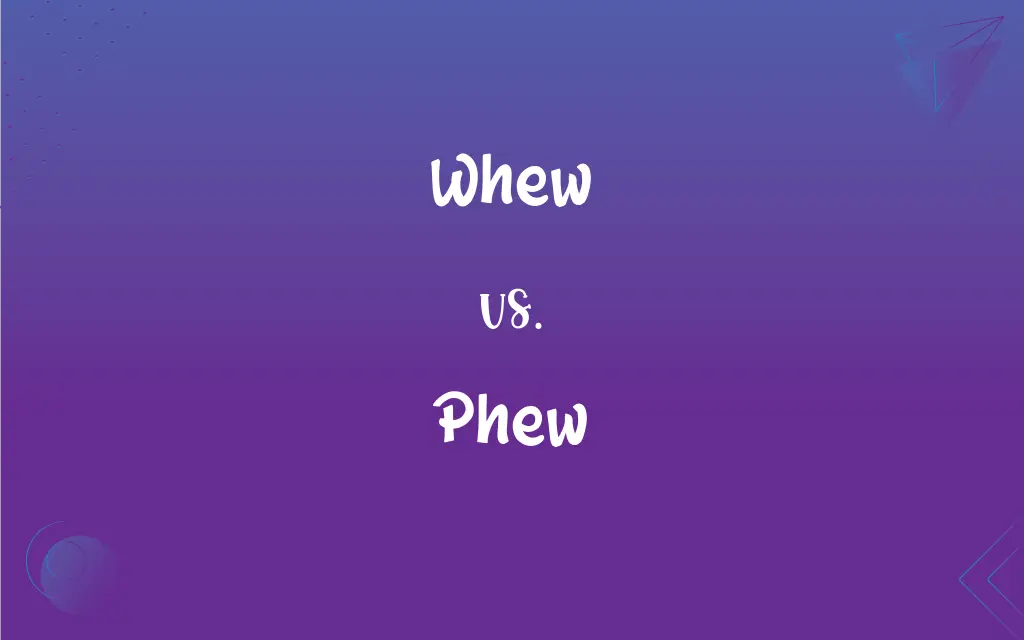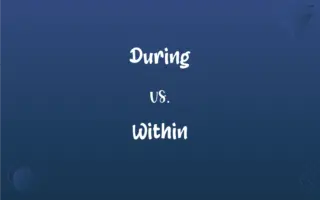Whew vs. Phew: What's the Difference?
By Aimie Carlson & Harlon Moss || Updated on May 20, 2024
Whew and phew are interjections expressing relief, with whew often indicating amazement or exhaustion, and phew typically showing relief from discomfort or unpleasantness.

Key Differences
Whew is an interjection used to express a sense of relief after exertion, amazement, or narrow escape from danger. It often conveys a mixture of relief and amazement, indicating that something challenging has been completed or avoided. Phew, on the other hand, is more commonly used to signify relief from something unpleasant, such as a bad smell, stress, or a tense situation. It emphasizes the sense of escaping discomfort or a difficult situation.
While whew often carries a sense of physical or mental exhaustion and amazement, phew is more about the relief from discomfort or a potentially negative situation. Both convey relief, but the context and nuances differ slightly.
Whew can be used in contexts where someone has just completed a strenuous task or faced a close call. Phew is typically used when someone feels relief from stress or an uncomfortable experience, such as a narrow escape from danger.
In daily conversation, whew might be used after intense physical activities or exciting moments, while phew is more often used when someone is relieved that an unpleasant situation has ended or been avoided.
Both terms are informal and primarily used in spoken English, adding emotional context to the conversation by indicating the speaker's sense of relief.
ADVERTISEMENT
Comparison Chart
Definition
Interjection for relief, amazement, or exhaustion
Interjection for relief from discomfort or unpleasantness
Common Contexts
After exertion, amazement, close calls
After unpleasant experiences, bad smells, stress
Emotional Nuance
Relief with amazement or exhaustion
Relief from discomfort or potential danger
Usage
Often after physical or mental challenges
Often after stressful or uncomfortable situations
Formality
Informal
Informal
ADVERTISEMENT
Whew and Phew Definitions
Whew
Expresses relief after exertion or effort.
Whew, that workout was tough!
Phew
Expresses relief from an unpleasant situation.
Phew, I’m glad that exam is over.
Whew
Shows a sense of being overwhelmed by emotion or activity.
Whew, what a day!
Phew
Conveys relief after avoiding trouble or danger.
Phew, that was a close one!
Whew
Indicates amazement or astonishment.
Whew, I can’t believe we made it on time.
Phew
Signifies relief from a bad smell or discomfort.
Phew, that garbage really stinks!
Whew
Conveys relief after a narrow escape.
Whew, that was a close call!
Phew
Indicates the end of a stressful period.
Phew, what a hectic week!
Whew
Reflects exhaustion after a challenging task.
Whew, I’m glad that project is finally done.
Phew
Shows relief from tension or anxiety.
Phew, I thought I had lost my keys.
Whew
Used to express strong emotion, such as relief or amazement.
Phew
Used to express relief, fatigue, surprise, or disgust.
Whew
To whistle with a shrill pipe, like a plover.
Phew
Used to show disgust.
Phew, it stinks in here!
Whew
A sound like a half-formed whistle, expressing astonishment, scorn, or dislike.
Phew
Used to express relief of tension, fatigue, or surprise.
Phew, that took a long time to cook!
Whew
To whistle with a shrill pipe, like a plover.
FAQs
How is phew used in a sentence?
Phew is used to express relief from discomfort, e.g., "Phew, I’m glad that test is over."
What does whew mean?
Whew is an interjection expressing relief, amazement, or exhaustion.
What does phew mean?
Phew is an interjection expressing relief from discomfort or unpleasantness.
How is whew used in a sentence?
Whew is used to express relief after effort, e.g., "Whew, that was a hard workout!"
Is phew used for bad smells?
Yes, phew is often used to express relief from bad smells.
Can phew express relief from anxiety?
Yes, phew can express relief from tension or anxiety.
Do whew and phew have similar meanings?
Both express relief, but whew often includes amazement or exhaustion, while phew is more about relief from discomfort.
Can whew indicate exhaustion?
Yes, whew can indicate exhaustion after a challenging task.
Are whew and phew formal terms?
No, both whew and phew are informal terms.
Is whew an expression of amazement?
Yes, whew can express amazement or astonishment.
Can whew be used for relief after a close call?
Yes, whew can be used to express relief after a narrow escape.
Is phew used in written language?
Phew is primarily used in informal writing or dialogue to convey spoken relief.
Does whew indicate being overwhelmed?
Yes, whew can indicate a sense of being overwhelmed by emotions or activity.
Is phew used after stressful situations?
Yes, phew is commonly used after stressful or uncomfortable situations.
Is phew related to bad experiences?
Yes, phew often relates to relief from bad or unpleasant experiences.
Can whew and phew be used interchangeably?
While they can sometimes be used interchangeably, whew is more for relief with amazement or exhaustion, and phew for relief from discomfort or unpleasantness.
Is whew used after physical activities?
Yes, whew is often used after strenuous physical activities.
Is phew common in daily conversation?
Yes, phew is commonly used in daily conversation to express relief.
Can whew be used to show astonishment?
Yes, whew can be used to show astonishment.
Are both whew and phew interjections?
Yes, both are interjections expressing relief.
About Author
Written by
Aimie CarlsonAimie Carlson, holding a master's degree in English literature, is a fervent English language enthusiast. She lends her writing talents to Difference Wiki, a prominent website that specializes in comparisons, offering readers insightful analyses that both captivate and inform.
Co-written by
Harlon MossHarlon is a seasoned quality moderator and accomplished content writer for Difference Wiki. An alumnus of the prestigious University of California, he earned his degree in Computer Science. Leveraging his academic background, Harlon brings a meticulous and informed perspective to his work, ensuring content accuracy and excellence.































































